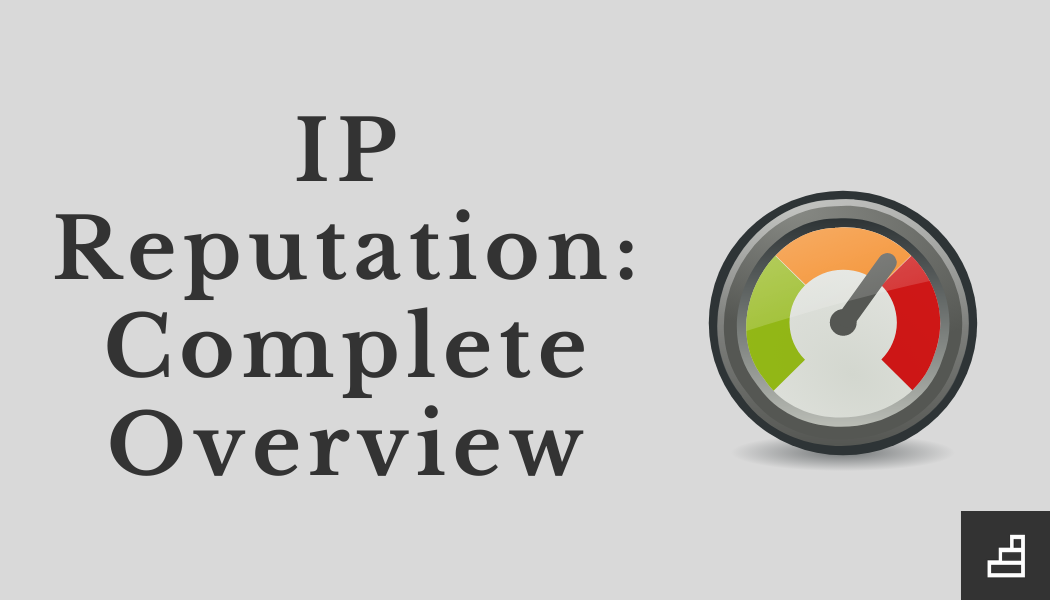
IP Reputation: Complete Overview
What Is an IP Reputation?
Your IP is a string of numbers used like an address to locate devices that connect to the Internet. Websites, computers, routers, servers, mobile devices, and more all use IP addresses to communicate with other devices.
IP reputations help email servers identify whether an incoming message is coming from a secure location. If an ISP gets an incoming message from a sender on an IP address with a history of good Internet use, then the ISP will likely let the message through to the recipient. However, if the IP address has a bad reputation because of poor Internet use, then the incoming message will likely be rejected or sent to the spam folder.
IP reputation is one of the multiple factors that ISPs look at when determining whether or not to trust an unknown sender. Connections to spam, phishing sites, malware drops, or other malicious activity can tarnish IP reputation.
There are two types of IPs: dedicated and shared. Dedicated IPs are exclusive channels that can only be used by those with the authorization to use the address. Anyone with an Internet connection can use shared IPs. If you want to have complete control over your IP reputation, you should invest in getting a dedicated IP for your company so you can monitor your Internet use.
IP reputations fluctuate constantly, so don’t worry if you find yourself with a bad IP reputation. You can take multiple steps to improve your IP reputation, especially if you switch over to a dedicated IP.
Why Is IP Reputation Important?
Having a positive IP reputation is essential because it impacts your email deliverability. A poor reputation indicates that you are a suspicious user, and ISPs won’t be willing to take the chance of placing your message into the recipient’s inbox.
ISPs and spam filters work around the clock to keep junk and malicious content away from their users, and if there’s any chance that they think your message could harm the recipient, they’ll send it to the spam folder or bounce it back.
Your IP address is used to get a better picture of the sending environment, and how you use your Internet connection is seen as an indication of your sending practices. A good IP reputation means that you’ll have a higher deliverability rate and lower bounce rate, and because of that, your email campaigns will be more successful.
How Do You Determine an IP Reputation Score?
Multiple elements work together to form an IP reputation score, including:
- Type of IP
- Age of the IP
- The IP’s history
- Your domain reputation
- The reputation of any URLs you’re associated with
- The presence of downloadable codes or files
- Previous and current associations with malicious internet objects
- The IP’s popularity
- The location of your host
- Who owns the network and website
- Your IP’s presence on blocklists
- Your IP’s presence on allowlists
Keeping tabs on your IP reputation is crucial, and there are multiple services you can use to monitor how various services rate your address. Some tools assign a score to your IP address, while others give a general term such as “good,” “neutral,” or “poor.” Ideally, you’ll have a high numerical score or a positive qualitative description.
Some of the best tools for checking your IP reputation include:
- Google Postmaster Tools
- Validity’s Sender Score
- Cisco’s Talos Intelligence
- BrightCloud’s Threat Intelligence
- MultiRBL
- MX Toolbox’s SuperTool
How to Establish an IP Reputation from Scratch
If you’ve decided to use a dedicated IP address, you’ll have to build your IP’s reputation from the ground up. This will take some time and effort but will be highly beneficial in the long run for your deliverability rate and marketing campaigns.
Let’s review some dos and don’ts for fostering a positive IP reputation:
Do's
- Proofread your messages to avoid any typos or “spammy” content. If you’re concerned about the language you use, you can run your email copy through a spam checker before you send it out
- Comply with the CAN-SPAM act by not using misleading subject lines or content and providing an unsubscribe button for your users.
- Warm up your IP address before you start sending out a large number of emails.
- Verify emails before adding them to your email list and frequently update your mailing list to weed out any inactive emails.
- Use double opt-in measures that enable your recipients to confirm that they want to receive content from you.
- Honor unsubscribe requests promptly, so you don’t have unnecessary bounces or spam complaints.
- Set up separate domains for marketing and transactional communications.
Dont's
- Start by sending out cold emails. Until your IP is warm and has a good reputation, it’s best to avoid sending emails to people who aren’t expecting to receive content from you.
- Buy email lists from sellers who claim to have a plethora of addresses for people in your target audience. These lists are often filled with fake addresses and spam traps.
- Scrape web pages or directories for email addresses. This can lead to sending emails to inactive addresses or unsuspecting consumers.
- Continue sending messages to addresses that have already resulted in a hard bounce.
- Allow unauthorized users to access your dedicated IP address.
- Get placed on any blocklists (and if you do, don’t wait to get off of them).
IP Reputation Tools
We listed multiple tools that you can use to check your IP reputation, but what about tools for improving and maintaining your IP reputation?
At Warmup Inbox, we provide an all-in-one platform to help you launch successful email campaigns. A significant part of that is helping you cultivate a positive IP reputation.
Our platform includes a live performance tracker that makes it easy for you to understand how ISPs view your IP address, domain, and inboxes. Warmup Inbox has real-time metrics that help you gauge the health of your inbox and make improvements to your email strategy. We consider all of the factors that make up your reputation and boil everything down into a straightforward report.
We’ll give your inbox a score from 0 to 10 and suggest ways to increase your score. At the same time, we’ll be warming up your inbox so you can focus on creating phenomenal content to send to your subscribers.
To see how Warmup Inbox can work wonders for your marketing team, try it for free here.
Newsletter
Join the newsletter to receive the latest updates in your inbox.




